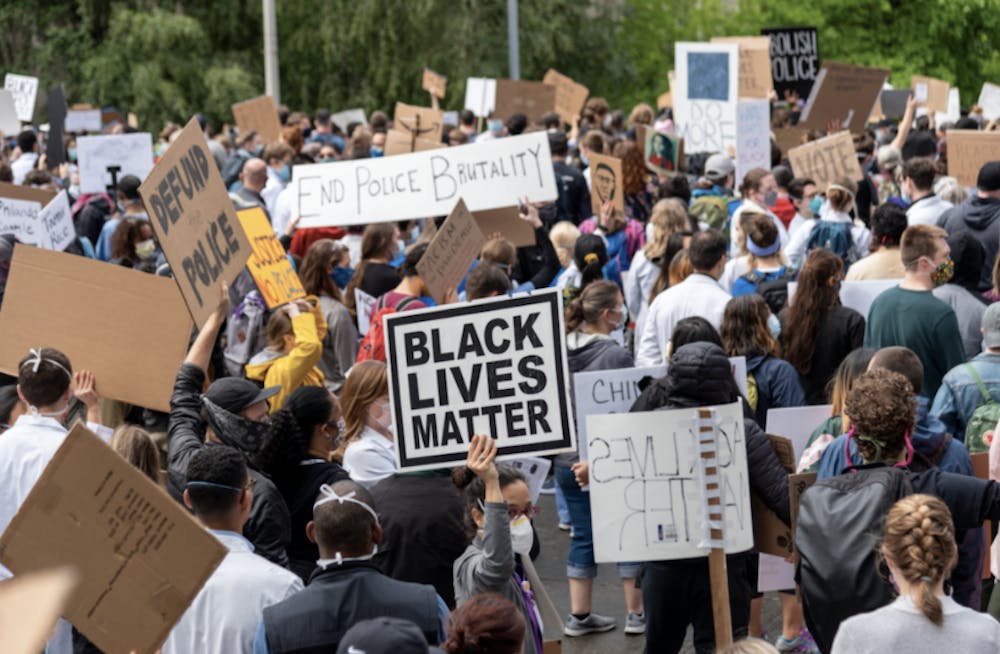By Jenna Hart and Cameron Bogdanoff
Staff Writer and Correspondent
The world turned upside down on May 25, when George Floyd, a Black man, suffocated to death under the knee of a white police officer, Derek Chauvin, in Minneapolis, Minn. The incident was caught on video and set the country into a rage, sparking protests nationwide. The protests took place in major cities, and the movement reached College students as well.
Amidst an isolating pandemic, it felt even more necessary to be as connected with the outside world. With more free time, people could delve into a plethora of information and educational resources constantly at the tips of their fingers, leading to a heightened amount of discussion about the Black Lives Matter (BLM) movement.

“In quarantine a lot of people could not go out, but they got involved within [BLM],” said Raymond Brady, a freshman sports medicine major. “They were able to get more information online, learn how to be involved, and advocate about it.”
Students found themselves drawn to the Black Lives Matter and what it represented, stood for, and was fighting against. Benjamin Fanta, a freshman physics secondary education major, said he first got involved with it last June when his old friend set up a protest in his hometown. “It’s definitely given me a greater outlook on life, and it’s helped me understand what’s really important, what I’m really fighting for, and how to support other people better.”
Although the magnitude of protests aren't as big as they were a few months ago, the College’s students are still speaking out in support for the Black Lives Matter movement. “No, they're not done protesting,” said Derrick Noble, a senior special education major. “And they're not going to stop protesting because of what's happening in the world.”
There are many different ways students are getting involved in protesting. Some are still taking to the streets to protest and some are protesting on social media.
“I believe that with the pandemic and school all coinciding, we as a student body have switched over to a more digital approach to support the movement,” said Nick Angelo, a freshman music major.
Freshman Open-Option Education major, Ashauna Francis, also expressed her view about the online approach to activism that has emerged from the movement’s “trendiness”. She believes people are able to label themselves as activists when their only action is re-sharing content.
“I think that posting things are important, but it takes much more than that. [Performative activism] allows people to be actors, but make them feel like accomplices, without actually doing the work that an ally or accomplice would require,” said Francis.
Others feel that this “trend” of protesting is slowly coming to an end. According to a Pew Research Center study, support for the Black Lives Matter movement among white people has decreased from 60 percent in June to 45 percent in September.
Although the popularity and frequency of conversations surrounding the movement have decreased with time, students at the College agree that there is still work to be done. “I think we need to do more as a whole, most of us are white, most of us are coming from a more privileged walk of life. It’s important to educate ourselves on this and really try and understand it,” said Fanta regarding TCNJ’s student body.
Francis also sees social justice education as just the beginning. “I feel like there is so much awareness being spread because of the trendy nature of our society and BLM movement, the next step after for individuals is to find organizations near them and ways to get involved.” She emphasized the need for a bottom-up approach to activism, instead of expecting a trickle-down method to work. “It starts where you are. You can't ignore your hometown, but try and help your entire state.”
Angelo continues to believe that the world still has a long way to go to correct these injustices, and promote the ideals that BLM intends to push forward.
“I cannot stress enough how important it is for TCNJ students to realize that the battle is not won yet,” he said.







